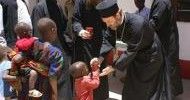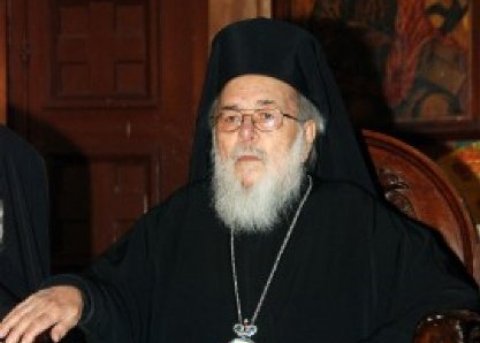
Ἕνας μικρός ἀντίλαλος τῆς ἐντολῆς: «Πορευθέντες μαθητεύσατε πάντα τά ἔθνη…» Στό τέλος τοῦ κατά Ἰωάννην Εὐαγγελίου ὑπάρχει μιά διευκρίνησις πρός τούς ἀποδέκτες τῆς ἐπιστολῆς–εὐαγγελίου: «…ἔστι δέ καί ἄλλα πολλά ὅσα ἐποίησεν ὁ Ἰησοῦς ἅτινα ἐάν γραφηται καθ’ ἕν, οὐδέ αὐτόν οἶμαι τόν κόσμον χωρῆσαι τά γραφόμενα βιβλία. ἀμήν.» (Ἰωάν. 21, 25).
Τό ὁποῖο σέ ἁπλῆ μετάφρασι ἀποδίδεται ὥς ἑξῆς: «…ὑπάρχουν καί πολλά ἄλλα πού ἔκανε ὁ Ἰησοῦς, τά ὁποῖα, ἐάν γραφοῦν τό καθένα, νομίζω, ὅτι ὁ κόσμος δέν θά χωροῦσε τά βιβλία πού θά ἐγράφοντο. Ἀμήν.»
Πολλοί θά θεωρήσουν ὅτι, στό σημεῖο αὐτό ὁ Εὐαγγελιστής ὑπερβάλλει… Εἶναι ὅμως αὐτό μιά ὑπερβολή; Σύμφωνα μέ τήν Ὀρθόδοξη παράδοσι καί τίς ἀποφάσεις τῶν Οἰκουμενικῶν Συνόδων τό Εὐαγγέλιο εἶναι ἀπ’ ἄκρη σ’ ἄκρη θεόπνευστο. Τά δέ Εὐαγγέλια εἶναι καταγραφή κάποιων σημείων τῆς Προφορικῆς παραδόσεως τῶν Ἀποστόλων πρός τίς νεοσύστατες (τότε) Ἐκκλησιαστικές Κοινότητες καί εἶναι γραμμένα σύμφωνα μέ τίς ὑπομνήσεις τοῦ ἁγίου Πνεύματος κατά τά λεγόμενα τοῦ Κυρίου:
«…ταῦτα λελάληκα ὑμῖν παρ’ ὑμῖν μένων ὁ δέ παράκλητος, τό Πνεῦμα τό Ἅγιον ὅ πέμψει ὁ πατήρ ἐν τῷ ὀνόματί μου, ἐκεῖνος ὑμᾶς διδάξει πάντα καί ὑπομνήσει ὑμᾶς πάντα ἅ εἶπον ὑμῖν» (Ἰωάν. 14, 25-27). Ἐπιπλέον, καί στά τέσσαρα Εὐαγγέλια ὑπάρχουν πολλές φαινομενικῶς «ἀσήμαντες» μαρτυρίες γιά πλῆθος θαυματουργικῶν θεραπειῶν.
Λόγῳ, λοιπόν, τοῦ ὅτι ὁ ἄνθρωπος εἶναι ἐπιρρεπής εἰς τήν λήθη, ὁ Πατήρ ἀποστέλλει τόν Παράκλητο, ὁ Ὁποῖος ὑπενθυμίζει τά ὅσα ἐνετείλατο «ἐν ἔργοις καί λόγοις» ὁ Χριστός κατά τήν ἐπίγειο ζωή καί δράσι του. Βέβαια, τό ἐργο αὐτό τοῦ ἁγίου Πνεύματος τῆς «ὑπομνήσεως» τῶν ἐντολῶν τοῦ Κυρίου, δέν σταματᾶ στήν Ἀποστολική ἐποχή, ἀλλά συνεχίζεται διά μέσου τῶν αἰώνων μέ τόν καθημερινό ἁγιασμό τῶν μελῶν τῶν ἐκκλησιαστικῶν κοινοτήτων καί τήν ἀνάδειξι ἁγίων μορφῶν καί ἀπό τά δύο φῦλα ἀλλά καί ἀπό ὅλες τίς κοινωνικές τάξεις καί ὅλη τήν ἐκκλησιαστική Ἱεραρχία. Ἔτσι, ἔχουμε Ἀποστόλους, Ἰσαποστόλους, Μάρτυρας, Ὁμολογητάς, Ὁσίους, Ἱεράρχας, Δικαίους καί Εὐσεβεῖς. Ἔχουμε ἁγίους Βασιλεῖς, Στρατηγούς, στρατιώτας, ἁλιεῖς, δούλους καί ἀπελευθέρους, ἁγίες ἐκ πορνῶν, στυλίτας, δενδρίτας καί διά Χριστόν σαλούς, ἁγίους καί ἁγίες αὐτόχειρας…
Ὅλες αὐτές οἱ τάξεις οὐσιαστικῶς μέ τήν ζωή τους καί τόν ξεχωριστό τρόπο πού ἁγίασαν «ὑπομιμνήσκουν» -ὑπενθυμίζουν- ἔργοις καί λόγοις ἕνα καί τό αὐτό πρᾶγμα: «τό πρόσωπον τοῦ Ἰησοῦ Χριστοῦ».
Θά λέγαμε ἐπίσης, ὅτι μέ τήν ζωή τους, τό παράδειγμά τους καί πολλές φορές καί τήν διδασκαλία τους ἀνασύρουν στήν μνήμη τῶν ἐκκλησιαστικῶν κοινοτήτων –καί τῆς καθ’ ὅλου Ἐκκλησίας– πολλά ἀπό αὐτά πού ἔκανε ὁ Ἰησοῦς Χριστός καί δέν ἐγράφησαν καί ἦταν τόσα πολλά πού ἄν ἐγραφοντο καθένα ξεχωριστά ὁ κόσμος δέν θά χωροῦσε τά γραφόμενα βιβλία…
Αὐτή εἶναι καί ἡ ἰδιαιτέρα ἀξία τῆς μελέτης καί προβολῆς τῶν συναξαριῶν τῶν ἁγίων στήν Ὀρθόδοξη Ἐκκλησία καί ἡ καθ’ ὅλου τιμή τῶν ἁγίων.
Συγχρόνως, αὐτός εἶναι καί ὁ ἀγῶνας τῆς συγχρόνου Ὀρθοδόξου Ἱεραποστολῆς στά πέρατα τῆς Οἰκουμένης, νά συσταθοῦν ἐκκλησιαστικές Κοινότητες μέσα σέ κοινωνίες πρωτόγνωρες καί πολλές φορές πρωτόγονες καί νά δημιουργηθεῖ ἡ «μνήμη τοῦ Χριστοῦ» ἡ ὁποία θά καλλιεργεῖται μέ τήν συνεχῆ «ἀνάμνησί Του» καί θά δημιουργήσει τίς βάσεις ἐκεῖνες πού θά ἀνασύρουν στήν μνήμη τῶν ἐκκλησιαστικῶν κοινοτήτων τά ὅσα εἶπε καί ἔκανε ὁ Χριστός καί δέν κατεγράφησαν «καθ’ ἕν» δηλαδή, τόν καθημερινό ἁγιασμό…
Ἔτσι καταννοοῦμε, ὅτι ἡ Ἱεραποστολή εἶναι μιά βασική προϋπόθεσι ὑπάρξεως κάθε Ἐκκλησίας καί ἀλλοίμονο στήν Ἐκκλησία πού ἔκοψε τούς δεσμούς της μέ τήν Ἱεραποστολή∙ εἶναι σάν τό δένδρο πού κόβει μόνο του τίς ρίζες του…
Πρέπει νά γίνει κατανοητό, ὅτι οἱ προσπάθειες ὅλων τῶν Ἱεραποστόλων εἶναι προσπάθειες τῆς Μιᾶς, Ἁγίας, Καθολικῆς καί Ἀποστολικῆς Ἐκκλησίας καί ὄχι προσωπικές ἐπιδιώξεις γιά νά ἀποκτήσουμε τόν τίτλο τοῦ Ἱεραποστόλου.
Δέν εἶμαι ἐδῶ γιατί μοῦ ἀρέσει τό ἄγνωστο καί ἀπαρηγόρητο τοῦ τόπου, ἤ ἡ περιπετειώδης ζωή καί δρᾶσι… Εἶμαι ἐδῶ συνεχίζοντας καί μετέχοντας στόν κλῆρο τῶν Ἀποστόλων Μάρκου καί Λουκᾶ…
Καί μοῦ εἶναι πραγματικά δύσκολο νά μιλῶ γιά τόν Χριστό μετά ἀπό δυό χιλιάδες χρόνια, ἀλλά σκέπτομαι τούς Ἀποστόλους πού μιλοῦσαν γιά τούς Προφήτας τοῦ Ἰσραήλ καί τίς Προφητεῖες τους καί ἀς εἶχαν περάσει αἰῶνες ἀπό τότε καί τήν ἐποχή τους … «Ἀδελφοί ἐξεπλήρωσεν ὁ Θεός τὴν ὑπόσχεσίν ἣν ἔδωκεν διά τῶν δοῦλων Του τῶν Προφητῶν… καί ἐξαπέστειλεν τόν Υἱὸν Αὐτοῦ…»
Σκέπτομαι τόν ἴδιο τόν Χριστό πού ἑρμήνευε τίς προφητεῖες στίς Συναγωγές καί ὁδηγοῦσε τόν λαό τοῦ Ἰσραήλ καί τούς Μαθητές Του στό νά δοῦν, νά ἀγγίξουν, νά ζήσουν, νά μετάσχουν στήν ζωή καί τόν θάνατο καί τήν Ἀνάστασι τῆς ἐκπληρώσεως τῶν Προφητειῶν… Καί λέγω, «δέν εἶναι δικός μου ὁ Λόγος ἐτοῦτος καί δέν ἔχω δικαίωμα νά τόν στερήσω ἀπό κανέναν», καί μιλῶ γιά τόν Χριστό γιά τήν ἐλπίδα τῆς Ἀναστάσεως σέ ἕναν κόσμο πού ζυμώνεται καθημερινά στά ἀδιέξοδα ἑνός φτηνοῦ καί ἀναίτιου θανάτου πού καλύπτει ἀπέραντες ἐκτάσεις ὑπάρξεων προορισμένων νά ζήσουν τήν αἰωνιότητα…
Πιστεύω, ὅτι, ἄν ἀνασταίνονταν στό σήμερα κάποιοι ἀπό τούς ἀρχαίους Τραγικούς καί εἶχαν τίς πληροφορίες πού ἔχουμε ὅλοι μας γιά τήν Ἀφρική, θά ἔγραφαν συνεχῶς νέες τραγωδίες γι᾽ αὐτήν, γιά νά στιγματίσουν καί νά θεραπεύσουν τή θανατηφόρο ἀδιαφορία μας!
Βέβαια, ἕνας κόσμος σάν τό δικό μας πού δέν ἔχει τήν παιδεία τῆς τραγωδίας νά τόν καλλιεργεῖ, δηλαδή τήν τάση «τῆς μιμήσεως τῆς σπουδαίας καί τελείας πράξεως», θά μποροῦσε νά καλλιεργηθεῖ σήμερα μέ αὐτόν τόν τρόπο; Εἶναι ἕνα ἐρώτημα που θά πρέπει νά συζητηθεῖ πάρα πολύ, διότι ἡ Ἐκκλησία οὐσιαστικά μιά τραγωδία παρουσιάζει σέ κάθε Εὐχαριστιακή Σύναξι: «τόν Χριστόν ἐνσαρκούμενον, πάσχοντα, θνήσκοντα, ἀνιστάμενον, ἀναλαμβανομένον καί ἐρχόμενον πάλιν μετά δόξης καί κρίνοντα τήν Οἰκουμένην…».
Πόσοι ὅμως ζοῦν πραγματικά διά τῆς τραγωδίας τήν ἐσχατολογική αὐτή διάστασι τῆς Εὐχαριστιακῆς Συνάξεως σέ κάθε Λειτουργία; Καί πόσοι ἀποδέχονται αὐτήν τήν διάστασι τῆς Ἐκκλησίας ὅπως τήν διδάσκει ἡ ἴδια ἡ Ἐκκλησία; Αὐτή εἶναι ἀκριβῶς ἡ ἀπόστασι, ὅσων θεωροῦν τήν Ἱεραποστολή ὡς «οὐτοπία καί τελειωμένη ὑπόθεσι» ἀπό τήν πραγματικότητα τῆς Ἐκκλησίας, τήν ὁποία ὑπηρετοῦν ὡς μιά ἴσως συναισθηματική τους κάλυψι∙ καί ἡ ἀπόστασι ἀπό καθαυτήν τήν Ἱεραποστολή, πού ἐπίσης οὔτε τήν ἔχουν ζήσει, οὔτε καί οὐσιαστικά τήν ἔχουν ἐξασκήσει.
Θά πρέπει νά γίνει αἰσθητό μέ κάθε τρόπο ὅτι εἶναι μιά ἐντελῶς διαφορετική κατάστασι νά μιλᾶς καί νά γνωστοποιεῖς: σέ ἀνθρώπους πού δέν ἄκουσαν ποτέ στήν ζωή τους τά περί Χριστοῦ μετά ἀπό 2000 χρόνια καί νά σπέρνεις τήν πρόσκλησι τῆς πίστεως σ᾽Αὐτόν, εἶναι κάτι ἄλλο νά μιλᾶς περί Χριστοῦ σέ ἀνθρώπους πού ἔχουν μιά ἐλάχιστη γνῶσι περί Αὐτοῦ καί κάτι τό ἐντελῶς διαφορετικό, νά προσπαθεῖς νά ἐξεγείρεις τό ἐνδιαφέρον περί τοῦ ἐκκλησιαστικοῦ τρόπου ζωῆς σέ ἀνθρώπους πού φέρουν στό DNA τους τήν ἀνάμνησι τῆς ἐμπειρίας τοῦ ἐκκλησιαστικοῦ τρόπου ζωῆς…
Ἀς ὑποθέσουμε ὅτι οἱ Ἱεραπόστολοι ἀσχολοῦνται μέ τήν πρώτη καί δεύτερη πραγματικότητα καί οἱ μή ἀσχολούμενοι μέ τήν Ἱεραποστολή ἀσχολοῦνται μέ τήν δεύτερη καί περισσότερο μέ τήν τρίτη πραγματικότητα.
Ὁ λόγος τῶν Ἱεραποστόλων θά πρέπει νά μήν ἀναφέρει ἁπλῶς ἱστορικά γεγονότα, ἀλλά θά πρέπει νά ἔχει αὐτήν τήν ποιότητα καί αὐτήν τήν δυναμική «νά ἐνσαρκώσει, νά γεννήσει» τόν Χριστό στίς ὑπάρξεις τῶν ἀνθρώπων… καί νά ἀκολουθησουν οἱ ἄνθρωποι τήν ἐπίγεια ζωή τοῦ Κυρίου καί νά πιστοποιηθεῖ ἡ πίστι τους «διά τῶν ἐπακολουθούντων σημείων» τῆς παρουσίας τοῦ Χριστοῦ στήν ζωή τους καί νά δημιουργηθεῖ «ἡ μνήμη» πού θά ἀναγεννᾶται διά τοῦ Μυστηρίου τῆς Ἀναμνήσεως.
Ὁ λόγος τῶν Ποιμένων στίς Ἀρχαῖες Ἐκκλησίες δουλεύει στήν βάσι ὅτι ὑπάρχει ἤδη «ἡ μνήμη»… Οἱ ἄνθρωποι ἔχουν, ἐπιθυμοῦν, καλλιεργοῦν ἤδη μιά σχέσι μέ τόν Χριστό ἀκόμα καί ὅταν ἀδιαφοροῦν φαινομενικά γι᾽ Αὐτόν…
Αὐτή ἡ οὐσιαστική διαφορά τῶν δύο λειτουργιῶν τοῦ Ἑνός καί μόνου Ἐκκλησιαστικοῦ Λόγου περιγράφει ὀφθαλμοφανῶς τίς δυσκολίες καί τά προβλήματα τῶν Ἱεραποστόλων, ἀλλά καί τήν ἀναγκαιότητα τῆς ὑπάρξεως τοῦ Ἱεραποστολικοῦ λόγου καί στήν σύγχρονη πραγματικότητα τῶν Ἀρχαίων Ἐκκλησιῶν, πού κάθε ἄλλο παρά ζωντάνια τίς χαρακτηρίζει…
Ἴσως ὁ λόγος μου ἀκούγεται σκληρός καί αὐστηρά κριτικός… μά πρέπει ἡ αὐτοκριτική μας νομίζω νά ἀνάγεται καθημερινά καί σέ κάποια ἄλλα θεολογικά ἐπίπεδα πού θά μᾶς βοηθήσουν νά βελτιώσουμε τήν θέσι μας ὡς Ποιμένων τῆς Ἐκκλησίας καί αὐτό γίνεται μόνον διά τῆς συνεχοῦς ἀνατομίας τῶν ἐλλείψεών μας…
Τόν ἁσπασμόν τῆς πίστεως εἰς πάντας τούς ἀδελφούς ἐκ τῶν ἐν Ἀφρικῇ ἐλαχίστων ἀδελφῶν τοῦ Κυρίου μας…
+ ὁ Καμερούν Γρηγόριος
http://www.metropolisofcameroon.org/gr/el/news-events/muiotalambdanutaualphasigmaf-gammaiotaalpha-tauomicronnu-chirhoiotasigmatau-sigmatauetanu-alphaphirhoiotakappa/




































































